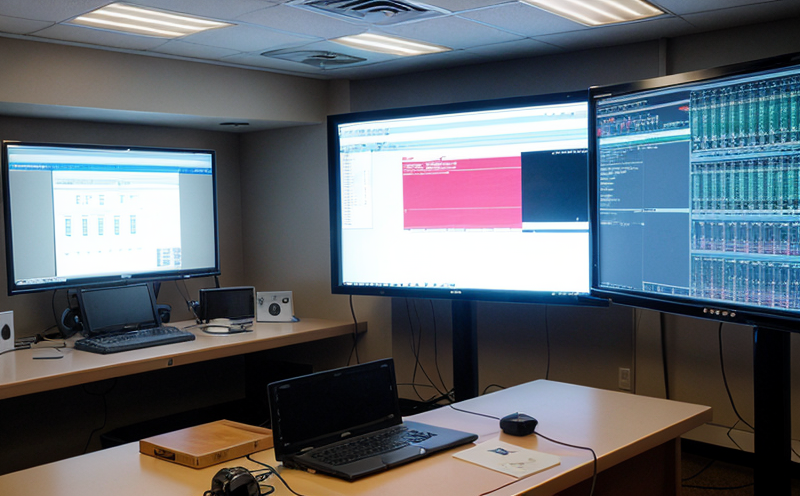EN 50159 Communication Protocol Security Testing for Signaling Systems
The European Standard EN 50159 specifies the security requirements and testing methods for communication protocols used in railway signaling systems. This service is critical to ensuring that these protocols are secure against unauthorized access, manipulation, and eavesdropping. Railway transportation relies heavily on signal integrity to ensure safe and efficient operation of trains. Any breach or failure can lead to catastrophic outcomes. Therefore, rigorous security testing is essential.
The EN 50159 protocol is designed to protect the signaling systems from various threats including cyber-attacks, electromagnetic interference (EMI), and other environmental factors that could compromise the integrity of the communication channels. By adhering to this standard, railway operators can ensure the reliability and security of their systems.
Our service involves a comprehensive approach to testing these protocols. We use state-of-the-art equipment and methodologies to simulate real-world scenarios where potential vulnerabilities might arise. This includes but is not limited to:
- Vulnerability assessments
- Cryptographic analysis
- Network penetration tests
- Data integrity checks
The testing process is designed to identify and address any weaknesses in the communication protocols that could be exploited by malicious actors. Our team of experts ensures that all aspects of the protocol are thoroughly examined, from initial design through to final implementation.
One of the key challenges in this domain is ensuring compatibility with existing systems while also keeping pace with emerging technologies. We work closely with our clients to ensure that their signaling systems meet current and future requirements. This includes:
- Compatibility testing with legacy equipment
- Integration with modern communication infrastructures
- Future-proofing against potential threats
The results of our EN 50159 compliance tests provide peace of mind for railway operators. They demonstrate that their systems are robust and secure, reducing the risk of operational disruptions due to security breaches.
Our service also includes detailed reporting tailored to the specific needs of our clients. This report not only highlights any areas where improvements can be made but also provides recommendations on how to enhance security further. We aim to provide comprehensive insights that will help our clients make informed decisions about their signaling systems.
The importance of this testing cannot be overstated, especially given the increasing sophistication of cyber threats in today's world. By investing in robust security measures now, railway operators can protect themselves against potential risks and ensure continued safe and reliable operation of their trains.
Our team is dedicated to providing the highest level of expertise and service in this critical area. We are committed to helping our clients achieve compliance with EN 50159 and to ensuring that their signaling systems remain secure and dependable for years to come.
Applied Standards
| Standard Name | Description |
|---|---|
| EN 50159 | This standard specifies the security requirements and testing methods for communication protocols used in railway signaling systems. |
| ISO/IEC 27034-1 | This part of ISO/IEC 27034 provides a framework for information security management specific to IT service providers. |
| IEEE P1619.1 | This standard specifies requirements and guidelines for secure communication in the railway industry. |
International Acceptance and Recognition
The EN 50159 protocol is widely recognized and accepted across Europe and beyond. It is a crucial standard for ensuring the security of railway signaling systems, which are vital components in modern transportation networks.
Countries around the world have adopted this standard to ensure consistent levels of safety and reliability in their railway signaling systems. By adhering to EN 50159, operators can demonstrate their commitment to maintaining high standards of security and compliance with international best practices.
The acceptance and recognition of this standard is reflected in its widespread use by major railway companies and transportation authorities worldwide. This ensures that all parties involved are working towards the same goals of safety and efficiency in rail transport.
Environmental and Sustainability Contributions
- Promotes safe and efficient operation of trains, reducing risk of accidents
- Ensures reliable communication systems, minimizing delays and disruptions
- Supports the development of secure and sustainable railway infrastructure
- Encourages the use of advanced technology to enhance safety and security
- Promotes compliance with international standards for environmental protection
The implementation of EN 50159 contributes significantly to the overall sustainability of railway transportation. By ensuring secure communication protocols, we help reduce incidents that could impact the environment negatively.
Our service also supports sustainable practices by promoting the use of advanced technology and methodologies that minimize the carbon footprint associated with railway operations. This aligns with broader efforts towards creating greener modes of transport.





